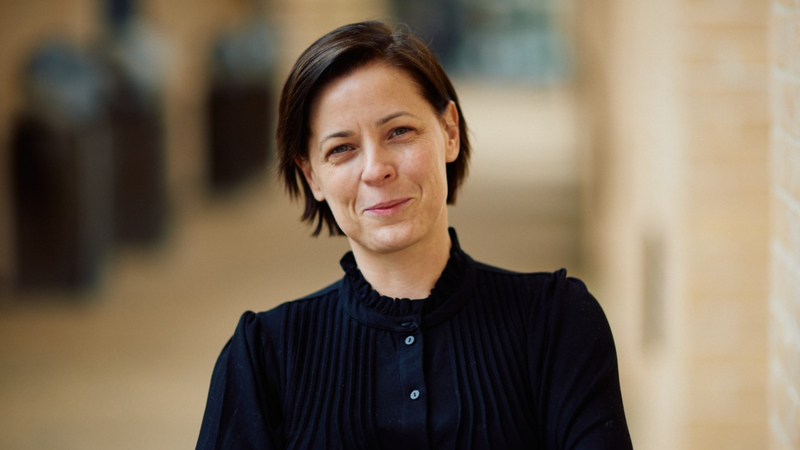You are viewing your 1 free article this month. Login to read more articles.
Rewriting the Canon: Bickmore basks in success of indie’s brand new approach
Francis Bickmore bustles into the Soho eatery where we are meeting, a bit breathless as he is running late. He starts as he goes on throughout the meal, talking excitedly, passionately and with a laser focus about books. (So focused that when I tell him Liam Neeson has sat down at a nearby table, he barely raises in eyebrow.)
Bickmore has reasons to be excited, because Canongate is coming off a helluva year. At the end of 2018 it was crowned the Saltire Society’s Scottish Publisher of the Year, a nice finish to a 12-month period in which it sold £8.7m through Nielsen BookScan, its third-best takings since records began in 1998.
What seems to please Canongate’s publishing director is not merely the upward trajectory of sales, but that it is the result of shifting priorities. He says: “We have had many years where there were a couple of standouts, but last year it was the breadth and depth of the list that worked, a range across fiction, children’s and adult non-fiction which was also supported by really strong backlist sales. This is all part of a deliberate objective to be less reliant on one or two things and have a steadier baseline level.”
Yes, Canongate does have Matt Haig, who earned £2.7m through the TCM last year. But even Haig’s year shows how the indie is not putting its eggs in one basket: the author had bestsellers with a children’s title (The Truth Pixie), a memoir (Notes on a Nervous Planet) and a novel (How to Stop Time). The spread betting helped in the festive season; in the seven-day period running up to Christmas, Canongate had 33 different titles in the TCM Top 5,000—a company record—14 of which sold more than 1,000 copies. Those Christmas crackers included the late Leonard Cohen’s poetry title The Flame; cookery writer Samin Nosrat’s Netflix-boosted Salt, Fat, Acid, Heat; and Rob Sears’ Trump and Putin spoof titles.
Christmas success can be difficult for independent houses, Bickmore acknowledges, as they must compete for precious promotional space with the deep-pocketed conglomerates. He says: “I think we have been better placed than a lot of indies [to acquire Christmas titles] as we’ve always been plugged into interesting voices of popular culture outside the sometimes fusty world of books. But I think the [festive] market has changed; celebrity memoirs aren’t sure-fire hits anymore, and it’s interesting booksellers are picking quality titles that they can turn into Christmas hits, whether it’s a Leonard Cohen or, looking across to one of our Independent Alliance colleagues, a Sally Rooney.”
This leads Bickmore to Robert Webb. The comedian and actor is a “celebrity”, but Bickmore says Webb’s book How Not to Be a Boy, which brought in almost £300,000 in paperback last year, is the antithesis of a celeb memoir and “is more like a wonderfully written polemic. Pure popularity with an audience in one field means nothing to readers anymore. The book has to be something special.”
Webb is one of several writers who epitomise another of Canongate’s strategic shifts: it is trying to build more brand authors. Bickmore name-checks several burgeoning talents he believes are on the cusp including former Everything But the Girl singer Tracey Thorn, whose second book, Another Planet, is out on 7th February; Alan Parks and his 1970s Glasgow crime series; and “the weird and wonderful” Jess Kidd, who “we think in five years could be at the Kate Atkinson level of straddling commercial success with quality writing and prizes”.

Canongate author Jess Kidd
Bickmore adds: “We have been thinking a lot of what constitutes a brand author. How do you sustain and build on booksellers’ and readers’ attention? You can’t fake it, it has to be genuine and the writing has to connect. It is a difficult thing for indies to do, but we can—and this has worked well with Matt Haig—because we have a small list and we give so much care and attention to each title. We stay off the treadmill of formulaic publishing, and try to make every campaign bespoke.”
Part of the brand-building blueprint is a new venture with Severn House, the list which focused on the US library and large print market. Canongate acquired the business in 2017, and in May it will launch Black Thorn, a crime imprint “curated” from Severn House authors; it will publish titles as £8.99 B-format paperbacks.
“It is an experiment,” Bickmore says. “We’ve never really done this kind of genre list before. But there are some great authors here, like Dave Hewson and Catherine O’Connell, who have never really been published into the UK trade before.”
Crossing borders
One of Canongate’s benefits, Bickmore believes, is that it is “bicoastal”, with one foot in Edinburgh and one in London. (Scotland has the shoe size: there are 30 staffers in the Edinburgh office, 15 in London). Bickmore notes that Canongate has published quite a few of Scotland’s modern classics in its 40-year history, such as Alasdair Gray’s Lanark, Louise Welsh’s The Cutting Room and Michel Faber’s The Crimson Petal and the White.
He says: “Our Scottishness goes back, if you’ll forgive me for being highfalutin, to that Enlightenment sense of Scottish internationalism. The sense that the centre of the world could be anywhere, and it could be in Scotland. We embrace our ambitious global Scottish perspective. Far from parochial, it’s a broadening out. Don’t get me wrong, London is important to what we do. But because we are not entirely subsumed by the surface tension on the bubble of London publishing, the ability to see beyond London has been one of our strengths.”
Bickmore has the long view on this because he has been man and boy at Canongate, originally joining the firm in 2000. But his relationship with the company goes back further. After growing up in Oxford, he went to the University of Edinburgh. While there, he approached his now boss, Jamie Byng, to advertise in a student magazine Bickford was running. That eventually led to some work experience at the publisher, and then a full-time job.
Bickmore has worked at nearly every level at Canongate in the intervening two decades, and in early 2018 was appointed to the board along with communications director Jenny Fry. Bickmore says: “A lot of editors jump around companies to learn new skills, but my role has constantly changed at Canongate, so I have never been bored. The great thing is I’m still learning—the best way to do that is to work with brilliant people. And to remember what you learnt each year, you have to relearn to adapt for the changing market. We need to keep attuned to what people are reading and not take it for granted that people are always going to want to read books. And always be trying to find ways to grab people’s attention back from these huge distractions of social media, phones, the internet and streaming TV.”
Three titles to watch

Night Boat to Tangier
Kevin Barry
April, £14.99, 9781782116172
The IMPAC Award winner returns with with a tragicominc novel “drenched in sex, death and narcotics.”
Galloglass
Scarlett Thomas
April, £12.99, 9781782119333
The fourth title in Thomas’ surging YA fantasy series.
The Garden of Evening Mists
Tan Twan Eng
May, £8.99, 9781786893895
The Booker shortlistee will be the 100th of the Canons, Canongate’s modern classics list, and will be published with a new series logo and repackage.














